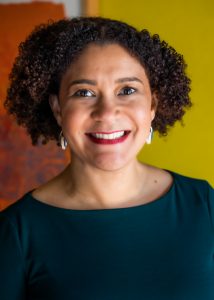From IT to property management, paid internships are connecting teens to careers
By Laura Aka, Working Nation
Published: October, 15 2021
Urban Alliance has placed over 6,000 teenagers in internships and has trained more than 21,000 in workforce skills.
As the nation grapples with racial reckoning, so too are corporations and industries. While they’ve pledged to diversify their ranks, advocates point out that more focus needs to be placed on the removing the roadblocks for young people of color just to enter the workforce. Case in point: the unemployment rate for Black teens is far higher than the unemployment rate for white teens.
One solution posed by the nonprofit Urban Alliance is to build pathways into the workforce by providing job skills for students while they are still in high school. The goal is to prepare them for meaningful careers once they graduate high school whether or not they go to college.

“We know that many youth, especially young adults of color, face extensive barriers to success when entering the workforce from lack of access to opportunities to lack of access to networks to a gap in knowledge of all the opportunities that are out there for them,” says Elizabeth Lindsey, CEO of the Urban Alliance.
Lindsey stresses the need to prepare students to enter the workforce after high school graduation and she’s encouraged to see more high schools adding jobs skills training to their curriculum. “It’s really exciting to see that more and more high schools realize that not all of their students are going to go to college. Even those that do might not really have an understanding of what the workforce is like,” explains Lindsey.
To open doors to opportunities, the Urban Alliance works with partners to provide internships for an estimated 500 high school seniors each year in underserved communities in Washington DC, Baltimore, Chicago, and Detroit.
Building Connections and Preparing for the Workforce
In its 25 years of operation, Urban Alliance has placed over 6,000 students in internships and has trained more than 21,000 in workforce skills. Working through local high schools and school districts to reach students, it provides internships lasting roughly eight months with training for all kinds of industries from banking to IT to nonprofit work. Students earn an average of $8,000 over the course of the program with a majority of them using that income to help support their families.

18-year-old Mark Turner of Detroit is one such student. Turner is a 2020 alum of the Urban Alliance program, completing an IT internship that landed him a job as a technical support specialist upon his high school graduation. He’s since been promoted and works full-time as an associate software engineer.
“Once you are on the job, you really connect with people and it gives you opportunities to talk to people and talk about their jobs and get career opportunities, pathways you might not have thought about prior to Urban Alliance,” explains Turner.
Turner says he expects to pursue a bachelor’s degree, which the Urban Alliance says it typical of 80% of its interns.
Real Estate Property Management Pathway
For the first time, Urban Alliance is offering internships in real estate property management. The Property Management Pathway pilot program launched in 2020 in the Washington D.C. area and is expanding to Chicago.
“This is a pathway where our students who choose not to go to college can move directly into a living wage job, a living wage career where there are opportunities for advancement,” says Lindsey. The organization is working with 21 partners and funders in the real estate industry, creating a new talent pipeline for the industry.

“Leaders have realized the incredible value that diversity can bring to this industry,” explains Ivan Barron, the executive director of the Pension Real Estate Association Foundation, a partner in the program. Barron credits Urban Alliance with opening doors. “They understand how to get into schools, how to work with them in a way that is beneficial for young people, beneficial for schools, and beneficial for these companies. That’s the secret sauce that’s been missing in creating viable pathways,” explains Barron.
The program offers two internships: one in apartment leasing, the other in apartment maintenance. Soft skills are offered with training provided for things like communication and handling situations in the workplace.
For students earning a certificate for apartment maintenance technicians, they learn skills that include electrical maintenance, HVAC (heating, ventilation and air conditioning), regulatory compliance, and environmental responsibility. Median pay for a job like this is $40,850 a year and does not require a college degree, according to the Bureau of Labor Statistics, which shows 8% growth in the field between 2020 and 2030.
For students earning a certified apartment leasing professional certificate, they are trained in areas such as customer service, lease preparation, marketing and sales and fair housing. Salaries for a typical leasing agent, according to industry estimates, range from $30,900 to $41,400 a year. The Bureau of Labor Statistics projects 3% growth in this field between 2020 and 2030.
Finding a Career in Property Management
Urban Alliance alum Nataya Garner is 19 years old and is now working full-time as a leasing consultant, a job she says she loves. She works with new residents and describes the Urban Alliance’s property management pathway as a life-changing program.

“This is something that I would have never expected to do in my life. It was just all around a great learning experience,” explains Garner. “Before I went into the program, I wasn’t really that confident in what I was going to do or where I was going to end up.” Garner sees opportunities for growth in her industry and plans to go to college while also pursuing a real estate license.
It’s a stark change from the period leading up to the internship when she says she almost gave up looking for work. She stresses the need for employers to take a chance on teens like her. “It was hard trying to find a job because of that whole ‘you need experience’ thing. But if you need experience, who’s going to give it to me? How would I ever get experience for this job if you are never going to step out there and take a chance and let me get some experience?”